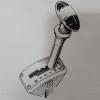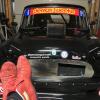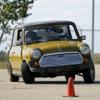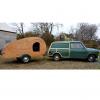
Suspension
#1

Posted 29 March 2025 - 12:51 PM
The camber on the rears are both 1 degree positive the front are 1/2 degree positive on a level floor.
I’m totally ignorant of the dark arts of suspension setting, to my logic getting a pair of adjustable bottom arms and altering the front camber to say 1/1.5 degrees positive should alleviate the uneven front wear Am I just dreaming or will it work or how can I solve the problem.
#2

Posted 29 March 2025 - 01:08 PM
For it to have only 0.5° positive camber, it must either have camber reduction arms or a worn/bent component somewhere.
How was the toe and camber measured? What's the toe out on turns?
Edited by 68+86auto, 29 March 2025 - 01:11 PM.
#3

Posted 29 March 2025 - 01:43 PM
For it to have only 0.5° positive camber, it must either have camber reduction arms or a worn/bent component somewhere.
How was the toe and camber measured? What's the toe out on turns?
Ahhh why didn’t I think they might be non standard arms!
String method for the toe, gunsen camber guage no idea how to check the toe out on turns.
If it was worn bent components the likelihood of both sides being exactly the same would be unlikely to my mind.
It’s had new hubs, top arms have new bearings and innards new bottom pins and bushes, new tie bars all 4 years ago.
Maybe to start with I should put some new standard bottom arm on and see where we are then.
#4

Posted 29 March 2025 - 02:32 PM
Sorry the words you are using are not actually making sense.
you say
The ride height is spot on toe out is correct all tyres at correct pressure.
Nope the rear should be toe IN.
so what is the front toe out figure?
post up your tracking results.
Increasing positive camber will NOT fix your problem.
#5

Posted 29 March 2025 - 05:33 PM
Thanks for all your input.
#6

Posted 30 March 2025 - 10:45 PM
#7

Posted 31 March 2025 - 12:36 AM
Wear on the inside edges usually indicates too much toe out. You say you used the string method to set the front wheel alignment. Are you aware that the rear track is narrower so you need to make allowance for that. Sorry if that's teaching Grandma to suck eggs.
https://www.calverst...-set-up-method/
#8

Posted 31 March 2025 - 12:41 AM
Wear on the inside edges usually indicates too much toe out. You say you used the string method to set the front wheel alignment. Are you aware that the rear track is narrower so you need to make allowance for that. Sorry if that's teaching Grandma to suck eggs.
https://www.calverst...-set-up-method/
I haven't read the article but that diagram could mislead someone if they don't fully understand what they are doing. There have been people on here previously who have done it incorrectly.
#9

Posted 31 March 2025 - 03:01 PM
A related question...
How does one correct crabbing? My rear is travelling a little to the right as compared to the front.
Is there a shim or some such to place between the body and frame at the rear left?
#10

Posted 31 March 2025 - 03:57 PM
The rear wheels MUST have a small amount of TOE-IN. It should be, in 'old numbers' between 1/8" and 3/16"
Thus, if the rear toe-in is correct, but the car is 'crabbing', you need to add a shim to one side whilst moving the bracket on the other side forward by the exact same amount. Of course, you can't actually move the other bracket forward, so you remove the bracket, file the forward end of the hole into a slot with the forward end of the slot exactly the same amount longer as the shim on the other side. Then, after fitting and checking, you weld a large washer onto the bracket to hold the position.
Adjustable brackets are available to do this, but I prefer the above method as it's stronger and, once done, it's a permanent fix.
#11

Posted 31 March 2025 - 04:37 PM
How does one correct crabbing? My rear is travelling a little to the right as compared to the front.
Is there a shim or some such to place between the body and frame at the rear left?
Before trying to fix, first check for play in the radius arm bearings. If they're sloppy, that's the first thing to fix. Also check the wheel bearings don't have excess play. If they're all fine then you know the geometry is wrong but is at least solid.
Then check whether the subframe has adjustable geometry - either by adjustable brackets or by having the holes for the arms (inside or outside) slotted. Could be that one of these adjustments - if available - has slipped and so just needs resetting and tightening. This is why it's recommended to weld a washer into slotted holes, rather than rely on tightness of the nut.
A toe-adjustment using shims may also already be present. This is unlikely to have slipped or altered, but you have the option to add or remove shims to adjust toe.
Bear in mind, also, the issue may be a slightly bent arm, but that's not something the average home workshop can check easily and, if the camber is still OK and the bend is small, it can be corrected by adjusting at the radius arm bearing tho if you later fit an unbent arm it'll be wrong again. (A bent arm, corrected in this way by adjusting the radius arm bearing, would result in the wheel being on a slightly wider or narrower track, but we're talking mm... and a Mini wasn't built to that tolerance anyway.)
Also, check that the subframe is square to the body. Repairs may have resulted in the heelboard going out of whack which then puts the subframe skew. (How you measure this, when nothing on a Mini is square... tricky. Maybe measure from mount-point to front wheel hub on each side. But then that assumes the front suspension is straight and equal both sides... and assumptions like that aren't necessarily sound, either.)
Before making any adjustments, accurately measure the rear toe on both sides, measured relative to the centreline of the car. It may be that one arm has correct amount of toe while the other has excess toe in/out. That'll change the "average" direction that the rear wheels are pointing and cause crabbing. Or maybe both have incorrect toe - one too much in and the other out.
What adjustments you make will depend on what's causing the misalignment. When correcting, be sure to get the correct toe-in. For example, it might be tempting to adjust only one side to make a "matched pair". But if that results in toe-out you'll have a car that doesn't crab but has undesirable handling.
#12

Posted Yesterday, 10:47 AM
A related question...
How does one correct crabbing? My rear is travelling a little to the right as compared to the front.
Is there a shim or some such to place between the body and frame at the rear left?
How have you determined that it's crabbing? It can visually look it from behind when it isn't.
If it's far out enough to actually be noticeable then there's probably a bent or worn component.
1 user(s) are reading this topic
0 members, 1 guests, 0 anonymous users


















